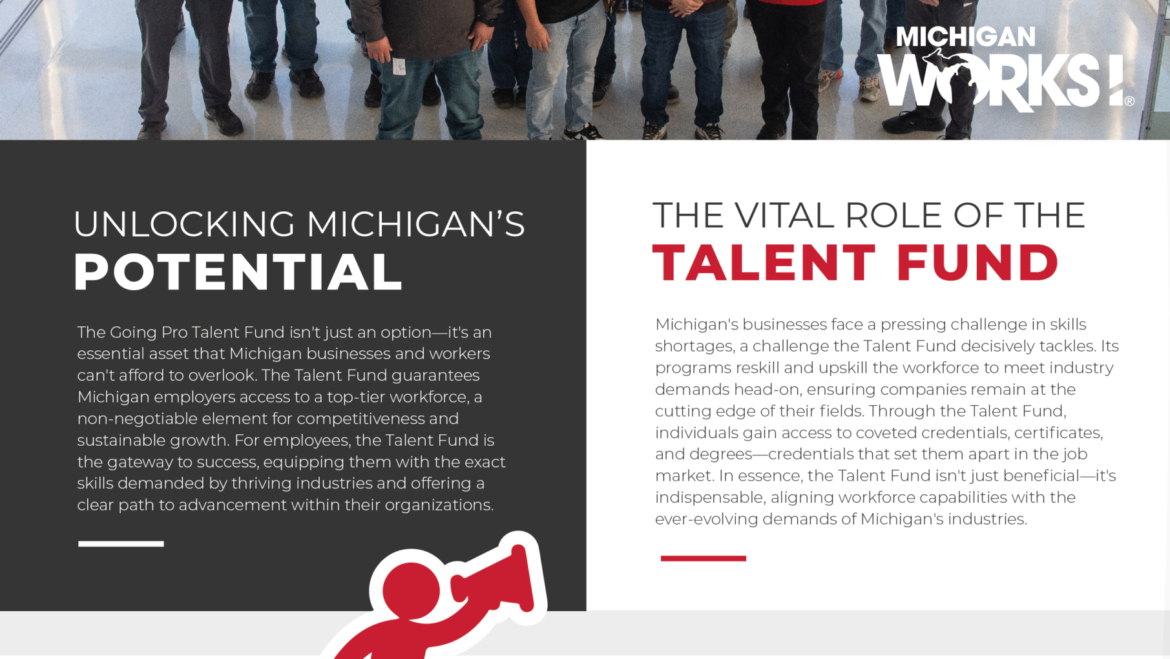The Going PRO Talent Fund 2024 Cycle 2 application period is open until May 10 at 5 p.m.
The Going PRO Talent Fund (GPTF) provides competitive awards for training that lead to increased employee productivity and retention. Funds are competitive, so a complete and accurate application is critical. An award to your company could support:
-
-
On-the-job training of new employees.
-
Existing staff training and development.
-
U.S. DOL Registered Apprenticeships.
-
Ready to get started? Contact your business solutions representative to access the GPTF portal to start your application. Not sure who your representative is? Contact us below to get connected!
Please note: Going PRO Talent Fund 2024 Cycle 1 awardees are not eligible to apply for Cycle 2.
GKW Business Solutions can assist with the application process for your organization. Many Lean and Six Sigma Courses Qualify for Going Pro Funds. Contact us for details.
What is the ROI on Training?
Training plays a crucial role in enhancing profitability and cash results within a manufacturing organization through various mechanisms:
- Improved Efficiency and Productivity: Well-trained employees are more efficient in their tasks, leading to increased productivity. They understand the manufacturing processes better, utilize resources effectively, and minimize downtime. Higher productivity means more output can be generated within the same timeframe, translating to increased revenue and profitability.
- Reduced Waste and Rework: Training helps employees understand quality standards and the importance of precision in their work. This leads to a reduction in defects, rework, and scrap materials, which can be costly for manufacturing companies. By producing goods right the first time, organizations save on materials, labor, and time, improving profitability.
- Optimized Equipment Utilization: Training programs ensure that employees are proficient in operating machinery and equipment. Proper utilization of equipment maximizes its lifespan, reduces maintenance costs, and avoids costly breakdowns or repairs. Additionally, trained personnel can identify and address minor issues before they escalate into major problems, minimizing disruptions to production schedules and maintaining cash flow.
- Cost Savings through Safety Measures: Training in safety protocols and procedures reduces the risk of workplace accidents and injuries. Workplace injuries not only incur direct costs such as medical expenses and compensation but also indirect costs like lost productivity, potential fines, and damage to the company’s reputation. By prioritizing employee safety through training, manufacturing organizations can mitigate these risks and safeguard profitability.
- Faster Time-to-Market: Training equips employees with the skills and knowledge required to adapt to new technologies, processes, and market demands swiftly. This agility in responding to changing customer needs and industry trends allows companies to bring products to market faster, capitalize on emerging opportunities, and gain a competitive edge. Shorter lead times lead to quicker revenue realization and improved cash flow.
- Enhanced Customer Satisfaction and Loyalty: Well-trained employees are better equipped to deliver high-quality products that meet or exceed customer expectations. Satisfied customers are more likely to repeat purchases, provide positive referrals, and maintain long-term relationships with the company. Improved customer satisfaction strengthens the brand reputation, increases market share, and ultimately drives profitability.
- Attracting and Retaining Talent: Investing in employee training demonstrates a commitment to their professional development and growth. This fosters a positive work environment, boosts morale, and enhances employee engagement and retention. A skilled and motivated workforce is instrumental in driving innovation, operational excellence, and ultimately, profitability.
- Strategic Decision-Making: Training programs provide employees with the knowledge and skills necessary to analyze data, identify trends, and make informed decisions. This empowers teams at all levels of the organization to contribute to strategic initiatives aimed at optimizing processes, reducing costs, and maximizing profitability.
In summary, training is not just an expense but an investment with tangible returns for manufacturing organizations. By enhancing efficiency, quality, safety, and agility, well-designed training programs contribute to improved profitability and cash flow, ensuring the long-term success and sustainability of the business.




